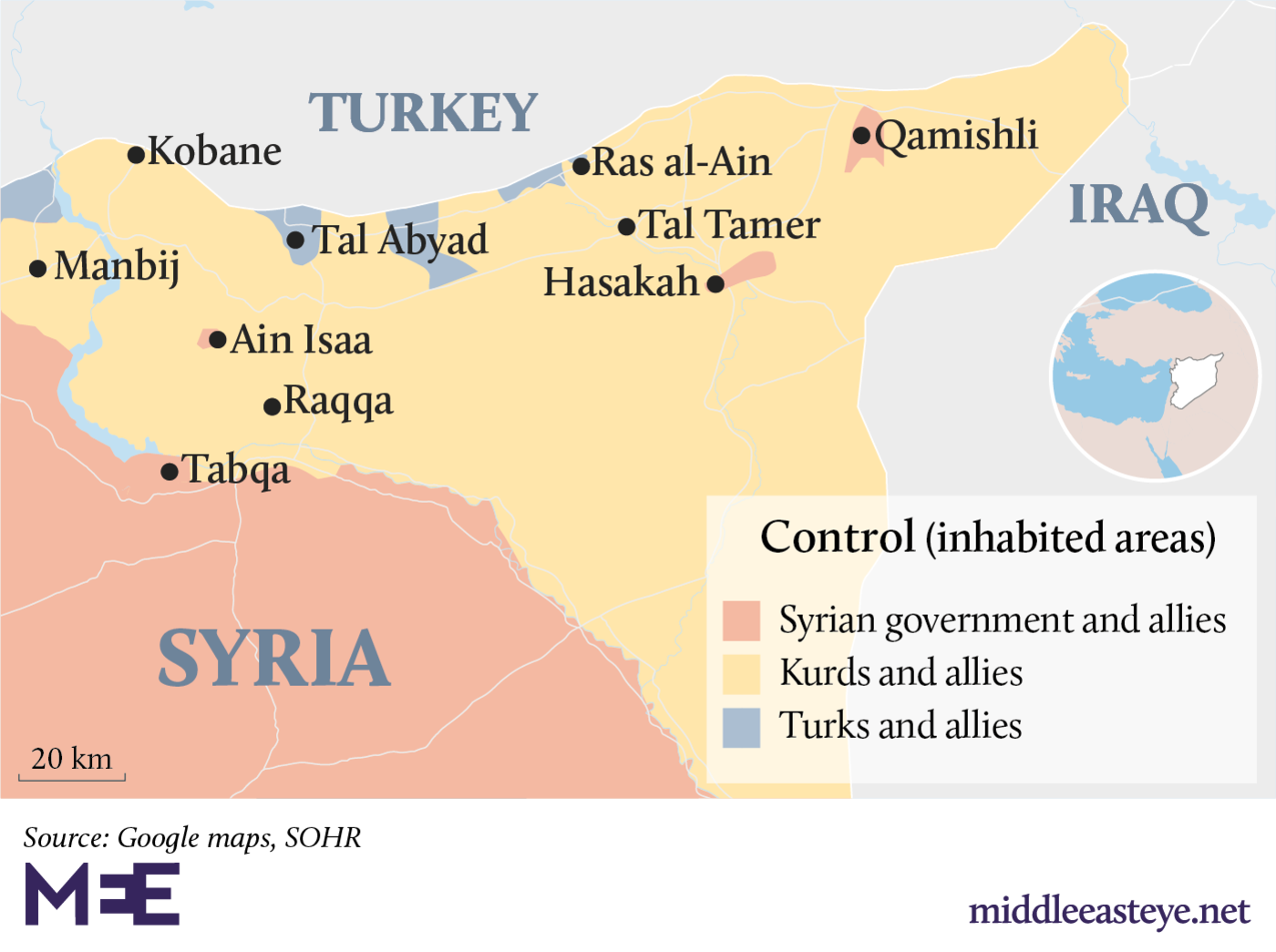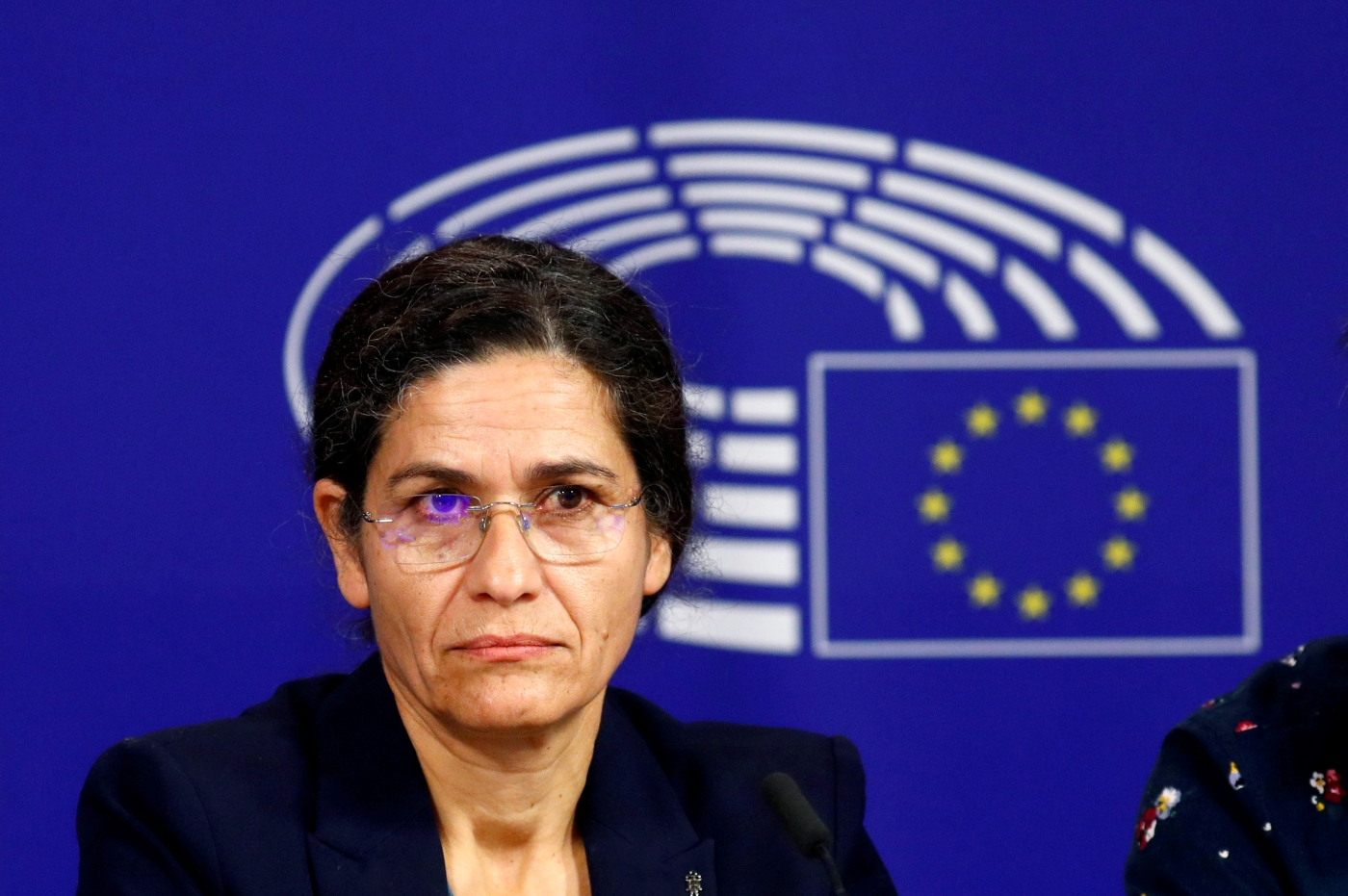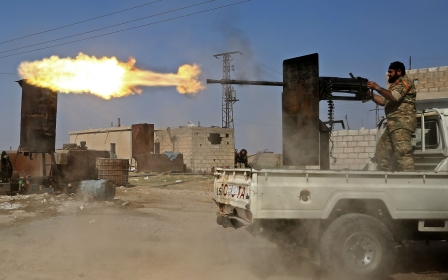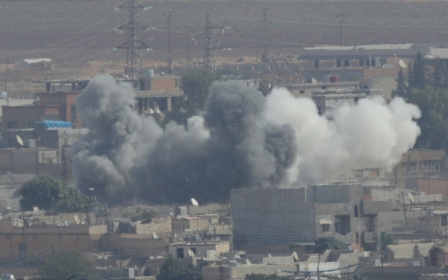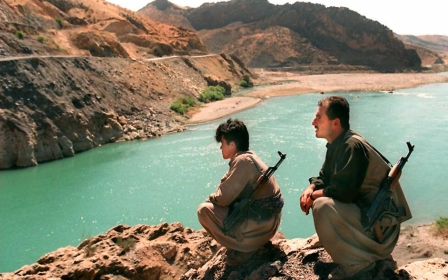Syrian Kurds urge Russia to impose no-fly zone to halt Turkish air strikes
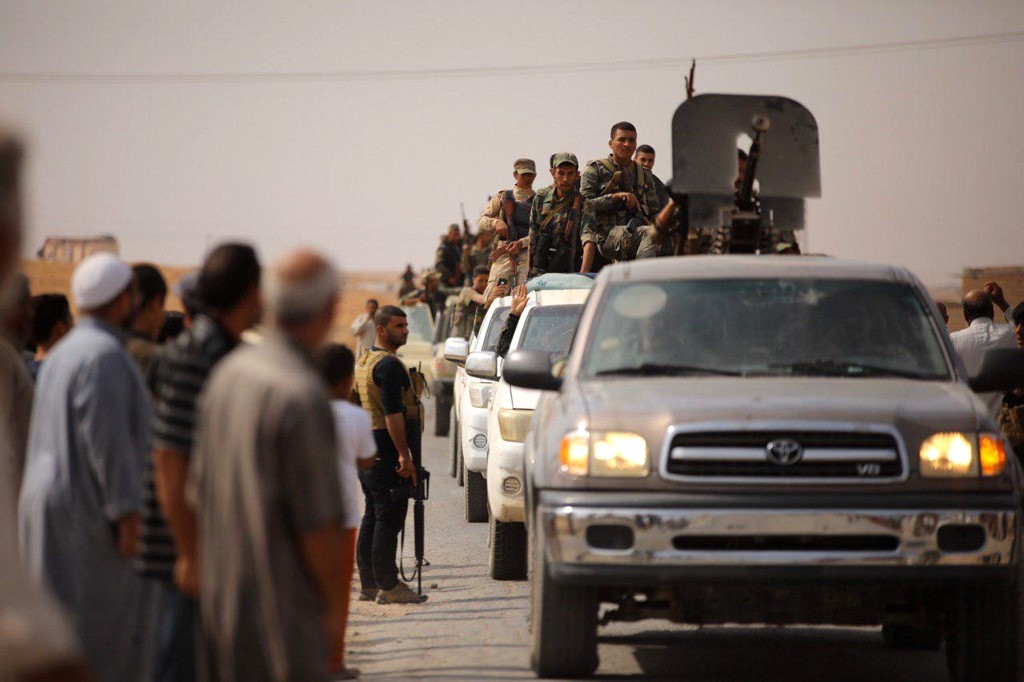
Kurdish leaders in northeastern Syria have asked Russia to impose a no-fly zone along the Turkish border to prevent Turkish air strikes in the area, a senior official has told Middle East Eye.
“It will be logical for the Russians to do this,” said Ilham Ahmed, the co-chair of the Syrian Democratic Council, the political wing of the Kurdish-led Syrian Democratic Forces (SDF).
“We tried to convince the US that if they want to pull out, at least they shouldn’t open the skies to Turkish warplanes. But the day before the Turkish invasion, we realised they were going to leave the skies open.”
In an interview with MEE, Ahmed also hinted that the Kurds might allow the Syrian government and Russia to enter the Deir Ezzor oil fields in eastern Syria, which she said are currently still in the hands of SDF and US forces.
The loss of the oil fields has meant a crippling loss of revenue for the government in Damascus, exacerbating the damage done by western sanctions targeting the Syrian economy.
New MEE newsletter: Jerusalem Dispatch
Sign up to get the latest insights and analysis on Israel-Palestine, alongside Turkey Unpacked and other MEE newsletters
“The US are still there now. For us, the wellbeing of our people is what is important. Whatever force is willing to provide security can stay. It could be the Russians,” she said.
Ahmed was speaking in Brussels where on Tuesday she addressed the European Parliament on the crisis caused by US President Donald Trump’s withdrawal of American troops from the region, and deadly fighting that has erupted following Turkey’s assault on Kurdish-held territory.
Why is Turkey invading northeast Syria?
+ Show - HideWho is fighting who?
Democratic Union Party (PYD)/Peoples Protection Units (YPG)
Founded in 2003, the PYD and its military wing the YPG are the ideological sister group of the Kurdistan Workers Party (PKK), which has fought a decades-long conflict with Turkey.
Following the beginning of the Syrian civil war in 2011, the PYD managed to take control of much of the Syria's north in the security vacuum that followed.
The group claims to espouse an ideology called "democratic confederalism", based on the ideology of PKK founder and leader Abdullah Ocalan, who has been in prison in Turkey since 1999.
Turkey
Turkey has long viewed the growth of the PYD with deep concern, and a peace process between Turkey and the PKK collapsed in 2015 in part over the spread of the Syrian Kurds' influence.
Since then, Erdogan has repeated his determination that he would "never allow the establishment of a Kurdish state in northern Syria".
What does Turkey want in northern Syria?
Turkey fears that a pro-PKK entity on its southern border would inevitably become a launchpad for attacks on Turkey.
In addition, Turkey wants to expell Syrian refugees from Turkey and resettle them in a "safe zone" it plans to create in northern Syria.
Turkey has the largest refugee population in the world, and the presence of Syrians in the country has increasingly led to animosity from Turks who blame them for crime, unemployment and the dilution of Turkish culture.
What does the PYD want in northern Syria?
The PYD's long-stated aim has been the creation of a statelet on the basis of Ocalan's ideology, as well as protecting Kurdish rights.
The area controlled by the PYD, known as Rojava, has established autonomy with networks of local councils and forums that aim to promote decentralised democracy - though the group has been accused of enforcing a one-party rule in the region.
What does the US-led coalition want?
Donald Trump was elected on a platform of isolationism and has touted the defeat of IS as the sole reason for US involvement in Syria - now that has largely taken place, Trump has argued the United States has no need to remain.
The biggest fear for the US and its allies is that Turkey's takeover of PYD-controlled areas could see the release of some of the 15,000 IS fighters previously captured by the Kurds and their allies.
What does the Syrian government (and its allies) want?
The Syrian government, as well as its close allies Iran and Russia, are happy about the US' decision to withdraw from the north, but have expressed concern about the violation of Syria's sovereignty by Turkey.
Syrian President Bashar al-Assad hopes that, when faced with the threat from Turkey, the PYD will throw their lot in with him in order to avoid total defeat.
Assad has repeatedly said he aims to regain control of all of Syria, and if the PYD was to ally with him formally, it would bring the largest area hitherto out of his control back under Damascus' influence.
She said that Russia had already helped to end clashes on the ground following a pact between the Kurds and Damascus which has seen Syrian government forces and allied Russian forces return to areas under Kurdish control in order to halt the Turkish offensive.
“The Turks killed two Syrian government soldiers near Manbij on Tuesday. The Russians intervened and asked Turkey to stop and they did,” said Ahmed.
Ahmed did not offer any more details about the incident.
The Syrian Observatory of Human Rights, a UK-based monitoring group, reported that two Syrian government soldiers had been killed in shelling by Turkey-allied rebels in the town of Ain Issa, about 100 km east of Manbij, on Tuesday.
Two Turkish soldiers were also killed in a mortar attack by Kurdish forces near Manbij on Tuesday.
Pact with Damascus
The pact between Kurdish leaders and Damascus sees Syrian government forces return to border areas which they vacated seven years ago at the height of the civil war between President Bashar al-Assad and opposition forces around the country.
But the move appears to threaten the autonomous status that the Kurds have enjoyed in areas which they call Rojava.
The pain of the concession was etched on Ahmed’s face even as she attempted to downplay its significance.
“The agreement was made in an emergency situation. Turkey was brutally attacking us so it was a good step in this context. Damascus and Russia took it upon themselves to defend an area which the US refused to defend,” she said.
“The border [with Turkey] is Syria’s border and it’s incumbent on the Syrians to defend it.”
She denied that Kurdish leaders had made any long-term political concessions in return for Syrian military help. The issue of giving up their autonomy had not come up in the talks with Damascus, she said.
Ahmed’s comments come after the Kurdish military commander, General Mazloum Kobani Abdi, was reported by CNN last week to have told a US diplomat that the SDF would seek Russian air protection if the US withdrew its forces.
According to a government briefing following Abdi’s meeting with William Roebuck, a senior US diplomat within the US-led coalition against the Islamic State (IS) group, the Kurdish commander said: “I need to know if you are capable of protecting my people, of stopping these bombs falling on us or not. I need to know, because if you're not, I need to make a deal with Russia and the regime now and invite their planes to protect this region."
'The Russians betrayed us'
While welcoming Moscow’s current role in blocking Turkish advances into Syria, Ahmed accused the Russians of betraying the Kurds last year by allowing Turkish forces and Turkish-backed Syrian rebels to enter Afrin, which had previously been held by Kurdish forces.
“The Russians opened Afrin’s air space and ground area to Turkey. The Russians betrayed us,” she said.
Ahmed accuses Turkey of seeking to drive Kurdish residents out of Afrin with the aim of settling Syrian Arabs in the region.
She suggested that former members of IS and other Islamist fighting groups were among those who Turkey had allowed to settle there.
“Some 800,000 Kurds used to live in Afrin, but now the number is 40,000. The others have been expelled or have fled to Aleppo, Qamishli, Iraqi Kurdistan or refugee camps,” she said.
“There are confiscations of property and abductions of civilians every day. They’ve destroyed the olive orchards and stolen archaeological and historic items. They’re imposing the use of the Turkish language and forcing non-Muslim Yazidis to go to the mosque.”
Amnesty International reported in August 2018 that 140,000 people fled from Afrin after the Turkish invasion and are living in displaced people’s camps. Human Rights Watch also reported widespread looting and destruction of houses by Turkish-backed fighters in Afrin.
Turkey has fiercely denied claims of forced expulsion and has accused the Kurds themselves of engaging in ethnic cleansing and suppression of opposition. It says it has enabled about 300,000 Syrians to return to their homes in Afrin.
It says the Peoples Protection Units (YPG), the main fighting force within the SDF, is aligned with the Kurdistan Workers Party, which is considered a terrorist group by Ankara, the US, and the European Union.
Responding to previous allegations by Ahmed, a senior Turkish official, speaking on condition of anonymity, told MEE in February: "It is PKK/YPG that performs ethnic cleansing in Syria, changes the demographic structure, persecutes people and does not recognise anyone's right to live other than itself."
The new Turkish invasion, this time in northeastern Syria, has led to 300,000 civilians fleeing their homes in border towns and villages, according to the Syrian Observatory for Human Rights on Wednesday. Most had gone further south into Kurdish-held territory in the hope that Turkish forces would be stopped.
At least 70 civilians, 135 SDF fighters and 120 Turkey-allied Syrian rebel fighters have been killed in the region since the offensive began, the Observatory said.
Middle East Eye delivers independent and unrivalled coverage and analysis of the Middle East, North Africa and beyond. To learn more about republishing this content and the associated fees, please fill out this form. More about MEE can be found here.


